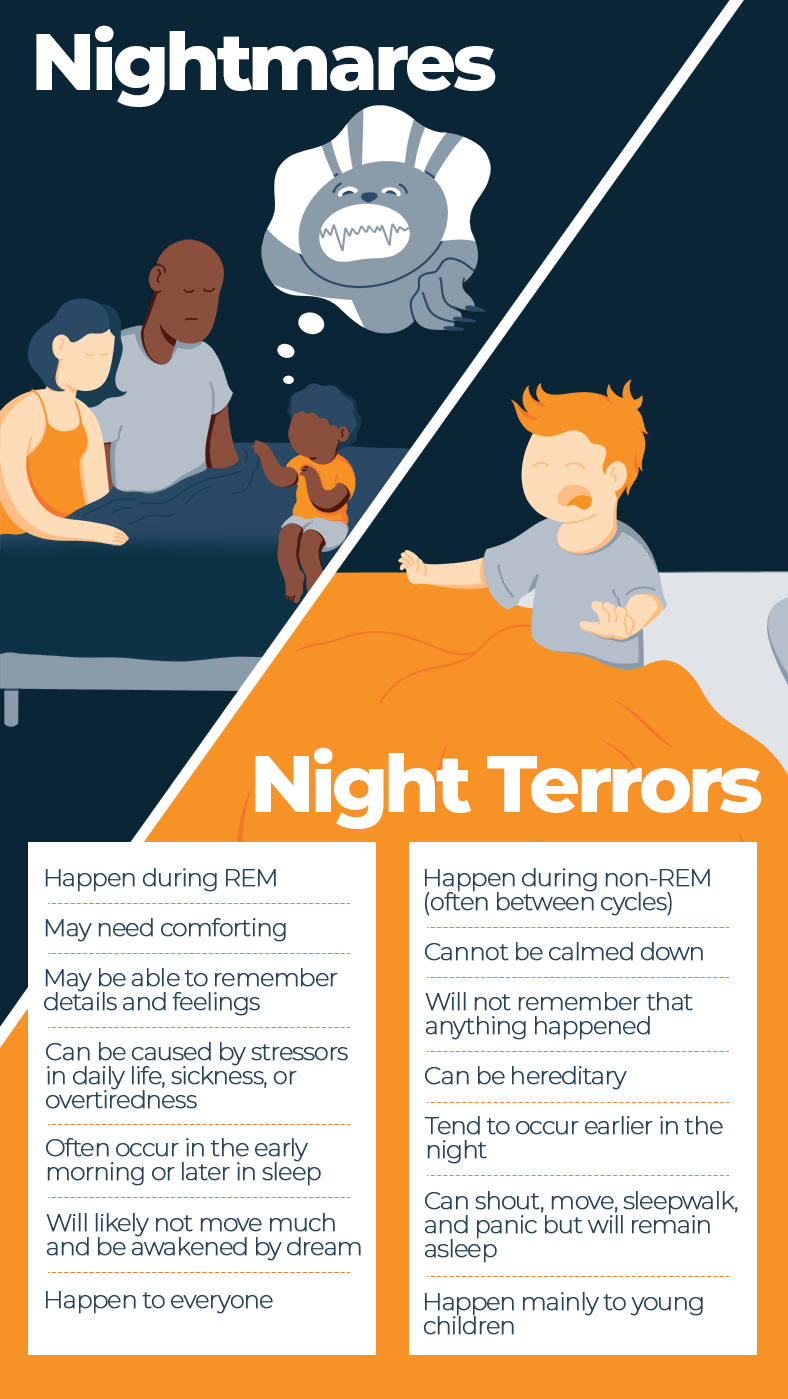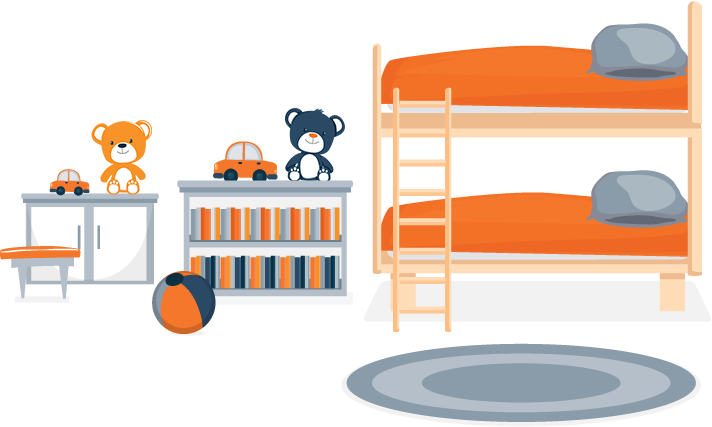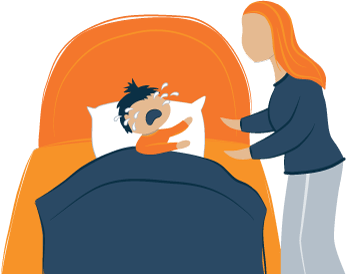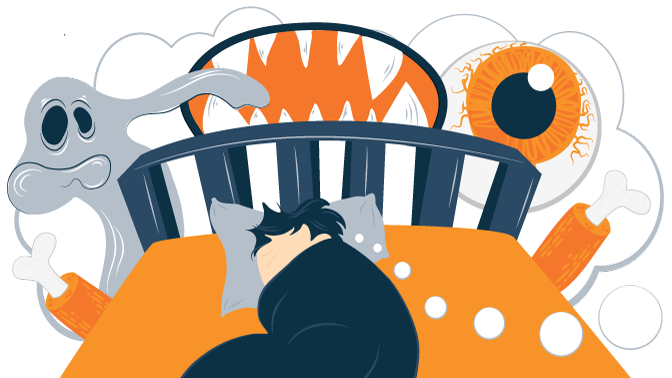Nightmares vs. Night Terrors
The biggest difference between a nightmare and a night terror is recall. In the case of a nightmare, your toddler will be able to explain in vivid detail everything that happened, from the monster’s fur to the size of the flames devouring the backyard. Though it’s not always the case, the source of a bad dream can often be pinpointed to a stressful event or trauma that your child has recently experienced or is currently struggling with. Scary television shows, movies, and books could also trigger a nightmare.
Night terrors, on the other hand, occur when your child is between stages of sleeping and wakefulness. They may sit up in bed with their eyes open or even get up. They could yell, scream, or panic. The incident could last anywhere from 10 to 30 minutes, and then afterward the child will often fall back asleep without needing comfort or soothing. In the morning, your toddler is unlikely to recall that anything out of the ordinary occured.
While nightmares affect everyone, night terrors are limited to about 3% of children. There’s also a genetic component to night terrors, yet nightmares occur universally.
Why do Infants Have Nightmares?
All dreams and nightmares occur during REM (rapid eye movement) sleep. In this stage of sleep, the brain is extremely active, and the eyes are moving rapidly underneath the eyelids. Children and adults could also experience twitching, jerking and vocal activity.
As infants and toddlers develop, they’re exposed to vast landscapes and situations that their brains need time to process. In addition, they’ve got vivid imaginations, and they’re also learning how to be afraid of things like the dark, monsters, and the boogeyman. These factors combine to set the stage for a perfect storm of semi-frequent nighttime arousals due to scary visions.
The key to helping your child cope with bad dreams and prevent them from interfering with sleep is to show your toddler that nightmares aren’t real and what they’re seeing in their dreams isn’t really happening. Once they understand that concept, it can go a long way in easing their mind.
How to Prevent It
Regular Sleep Schedule
Nightmares and other sleep disturbances are more likely to occur when a child is sleep-deprived or isn’t following a consistent routine. Toddlers should get around 12 hours of sleep per night (with a range of up to 13 or 14). Ideally, they should go to bed and wake up at the same time each day so that they have a consistent and stable routine.
Relaxing Sleep Routine
When it’s time for bed, your little one should feel relaxed and drowsy, not worried about scary visions or monsters under the bed. Each night, have a set routine that you follow before bed. This could include putting on pajamas that your toddler chooses, brushing their teeth, reading a story, playing with a stuffed animal, or snuggling with Mom and Dad.
When you tuck them into bed, make sure they know they are safe and secure.
Cozy Sleep Environment
Their bedroom should be a safe sanctuary that allows them to refresh and recharge for the busy day ahead. Some parents opt for a nightlight to add a sense of security. Just make sure it’s a warm hue and doesn’t contain blue light. Their bed should be comfortable, and the room temperature should be suitable for sleeping (about 65 to 68 degrees).
After you close (or crack) the bedroom door, take extra care to stay relatively quiet so that your baby can fall asleep without being distracted by noise, or use a white noise machine that can block external sounds.
Sleep Toys
Let your toddler sleep with a stuffed animal (or five) of their choosing. They’re good company and can be a cuddly companion if they’re feeling nervous or scared about going to sleep.
Avoid Scary Movies and Books
At this age, toddlers are still figuring out the fine line between what’s real and what’s make-believe. A scary movie or book blurs those lines and allows your child’s mind to run wild. Anything you share with your little one right before bed that contains a monster or scary component is a recipe for a nightmare.
Avoid Violent Games
Even though toddlers aren’t playing World of Warcraft, Grand Theft Auto, or Manhunt, they could still play games that affect how their mind processes information right before bed. For example, even Fruit Ninja shows fruit being sliced in half with its guts splattered everywhere.
Ways to Comfort Your Toddler
Be Present
Nightmares are unfamiliar territory, and your toddler needs comfort. Reassure them that their dreams aren’t real and can’t hurt them. They might think that their vision happened somewhere, so let them know that it’s all make-believe and didn’t actually happen. Remind them that you’re in the next room and will keep them safe from any burglars or intruders.
Be a Good Listener
Allow your little one to rehash what happened. It could help to talk about it, so they don’t have to keep the scary vision bottled up. By them telling you what they’re seeing in their nightmares, it gives you a chance to figure out if there’s something happening in the real world that could be a trigger.
Label What Happened
Remind your toddler that nightmares aren’t real, but don’t minimize or dismiss what they went through. Tell them that you used to have scary dreams when you were a kid and that sometimes you still do. It helps them relate and understand that what is happening to them also happens to everyone else.
Comfort
Don’t leave your little one all alone immediately following the aftermath. Give them some extra cuddles and snuggles so that they know they’re safe.
We recommend doing this in their bedroom, not yours. That way, they get used to knowing that their bedroom is just as safe as yours, and it prevents them from making sleeping in your bed a nightly habit.
Divert Their Imagination
Immediately following a nightmare, your toddler may be imagining the worst. Instead, lead them down a path that would have allowed their dream to have a positive outcome. Turn it into a game! For example, if your child dreamed that he was being chased by a monster, then ask what would happen if the monster was a friend who was lost, scared, and needed help.
Invite them to draw a picture of a positive outcome, though maybe save that activity for the morning so you can get back to sleep!
Lighting
If your toddler is afraid of the dark, then a nightlight can help them feel secure. They may also find comfort in a hallway light. Leave their bedroom door open slightly if it makes them feel safer.
Help Them to Fall Asleep
Your little one may seem amped up and not ready for bed, but everyone needs their rest, so after a period of comforting and reassurance, it’s time to get back to sleep. Tuck your child in with a favorite stuffed animal. Talk about happy dreams they could have instead of nightmares.
Frequently Asked Questions
Is it normal for babies to experience it every night?
Occasional nightmares are to be expected, but if it’s a daily occurrence, then there could be something emotional or psychological triggering them. Is your child going through something stressful like potty training or starting preschool? Is there a new sibling on the way? Did you recently move to a new house? Is your child getting enough sleep?
It might be helpful to keep a daily journal recording what’s happening during your child’s day. Include foods that they’re eating, books you’ve read to them, any movies they’ve watched, games they’ve played, or friends they’ve visited. You may be able to pick up on a pattern that’s responsible for fitful sleep.
Is this common when the child is sick?
Both nightmares and night terrors are more common when a child is sick. Mostly, it’s due to the physical stress and exhaustion that come with being ill. The result is that the unconscious mind is more susceptible to whatever fears they have.
What are common childhood nightmares?
Monsters, bugs, toys that come to life, and scary animals top the list of things your kid will dream about. The monsters and bugs are often more of a symbol of an internal fear, while the animals and toys could be a variation of a character in a story or movie. The flying monkeys in The Wizard of Oz are terrifying, right?
Other common themes have to do with your child’s separation anxiety. They could dream about being abandoned, getting lost, or getting kidnapped. These nightmares are also related to feelings of helplessness and lack of control over their environment.
Your child could also end up dreaming about being chased or not being able to move, which are also common themes in adults. These dreams often symbolize not being in control of a negative or stressful situation and trying to get away from it.
Conclusion
As a parent, it’s helpful to remind yourself that your child is experiencing the world with a fresh set of eyes. Every day is new to them, and they have a lot of information to process on a daily basis. At this stage, bad dreams can be especially scary and traumatic.
Your child may feel all alone and like they’re the only one seeing these frightening sights. Remind your toddler that everyone has dreams, both good and bad. Encourage them to think about happy thoughts before bed so that they can have sweet and pleasant dreams.
Jill Zwarensteyn
Editor
About Author
Jill Zwarensteyn is the Editor for Sleep Advisor and a Certified Sleep Science Coach. She is enthusiastic about providing helpful and engaging information on all things sleep and wellness.
Combination Sleeper





